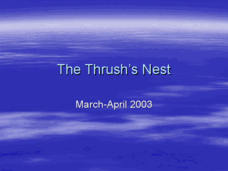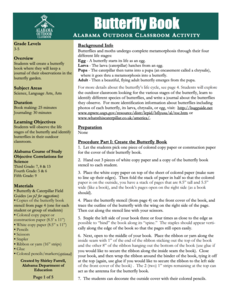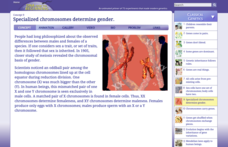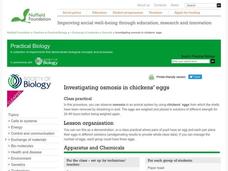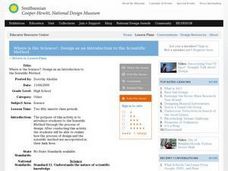Curated OER
Try These Egg-citing Activities to Celebrate Better Breakfast Month!
Have some fun with eggs while learning the health benefits they provide.
Curated OER
Where Are the Dinosaurs?
Learners view videos and websites and create finger puppets and hatchable eggs. In this dinosaur lesson plan, students view video clips and a website to introduce the dinosaurs. They do a finger puppet play and create hatchable dinosaur...
Curated OER
Eggs'ceptional Experiments
Students see evidence of chemical reaction and follow the scientific method to hypothesize, observe, and reach conclusions. They conduct a series of egg based experiments such as forming crystals and complete journal activities as a...
Curated OER
The Thrush's Nest
A gorgeous collection of slides follows the changes within the nest of a thrush over a month's time. Beginning with a single egg on March 15th, frequent photographs looking down into the nest are displayed. Finally, on April 14th, the...
Nemours KidsHealth
Food Allergies: Grades 9-12
Imagine life without PB&J's! For some, it isn't a question of want but a question of life and death. High schoolers investigate food allergies and develop presentations that inform others about symptoms of allergic reactions...
American Chemical Society
The Fate of Calcium Carbonate
Soften up an egg. Learners use vinegar to test for calcium carbonate in an egg shell and an antacid tablet and compare the reaction with vinegar to the reaction with water. In a second experiment, class members break down an egg shell...
Nemours KidsHealth
Food Allergies: Grades 6-8
Over two lessons, scholars use articles and discussions to define what a food allergy is and identify the most common food allergens. Small groups prepare a skit showcasing how the body exhibits an allergic reaction. Learners examine...
National Wildlife Federation
Call of the Wild: Grades K-4
The sound a frog makes lets people know what it's up to. A two-part lesson begins by discussing the life cycle of a frog and the individual stages with drawings. The second part has learners listen to the frogs' different sounds and what...
Alabama Wildlife Federation
Pasta Butterfly
From an egg to an adult and the stages in between, the butterfly leads a very active life. A hands-on activity has learners act out the different life cycle stages of the butterfly before venturing on an identification expedition. During...
Alabama Wildlife Federation
Bloomin' Butterflies
Get an up close and personal look at the metamorphosis of the butterfly. Pupils take ownership of their learning by collecting butterfly eggs, building a cage, and raising them to adulthood. The lesson resource provides instructions for...
Alabama Wildlife Federation
Butterfly Book
Journaling is a great tool for processing information. Budding scientists build their own butterfly journals from their observations in a butterfly garden. The lesson challenges them to identify different stages of the life of the...
Cold Spring Harbor Laboratory
Specialized Chromosomes Determine Gender
Are you an XX or an XY? Budding scientists learn about cellular fertilization and the determination of gender in a thorough online lesson. They follow their study with a set of interactive reflection questions.
Cold Spring Harbor Laboratory
Sex Cells Have One Set of Chromosomes; Body Cells Have Two
What's the difference between body cells and sex cells? Learners explore the question and the process of meiosis using an interactive lesson. An animation describes the discovery of meiosis and describes its phases for a detailed and...
Nuffield Foundation
Investigating Osmosis in Chickens' Eggs
You might not be able to learn through osmosis, but you sure can observe it! Scholars observe and measure osmosis using chicken eggs. They control for multiple variables to determine which variables have an impact and how the impact...
DiscoverE
An Egg-Citing Ride
Wheeeee! Young thrill seekers build a bungee jump—not for themselves, though, but for an egg. The egg must fall from a height of five feet and rebound within two inches of the ground or floor.
Biology Corner
Meiosis
Does day one of meiosis in your biology classroom make you wanna split? Get the class off to a great start using this attractive and thoughtfully worded slideshow. In addition to explaining what happens during each step of meiosis,...
Cornell University
Let’s Raise Lacewings
Young entomologists explored beneficial insects and how they help control pests in the first lesson of the series. Now class members take a close look at the lacewing, which is a beneficial insect.
King County
Reproductive System
It's every health and science teacher's favorite subject to cover: the reproductive system. This comprehensive lesson introduces adolescents to the reproductive anatomy of men and women with the help of a series of diagrams,...
Curated OER
Where is the Science?: Design as an Introduction to the Scientific Method
Students work to create a design that will protect an egg from being dropped from a one story floor. They test their prototype after it is completed. They write clear instructions and link aspects of the design process to the scientific...
Curated OER
Eggs
Are you looking for a lesson on eggs for your young farmers? This one could be for you! Learners discover where eggs come from. They see the whole process of an egg coming from a hen, and ending up on their breakfast tables. They...
Curated OER
Let Me Out! Dino Eggs
Students conduct research about animals that lay eggs such as reptiles and birds. After identifying characteristics of reptiles and discussing the connection to dinosaurs, they create a three-dimensional paper mache dinosaur egg with a...
Serendip
Genetics
A handout on genetic inheritance begins with a reading on alleles and how they can result in albinism. Junior geneticists learn to complete Punnett squares and participate in a coin toss simulation of allele pairing. They also learn...
Curated OER
About Chickens
Here's a cute and informative four-page packet of worksheets about chickens for your young agriculturists. They get to write words that have to do with chickens, perform cut-and-paste activities, and discover some fun facts about...
Curated OER
The Birds of a Feather Flock Together
Fifth graders identify all parts of an egg, and explore their importance to the life cycle of a chicken. Learners compare all sorts of birds and place them in categories based on what they look like. This five-day lesson effectively...





